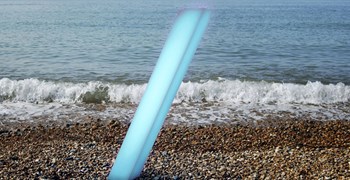Huge pink granite Pictish stone moves into Scotland's oldest independent museum
This article originally appeared on Culture24.
Between the 3rd and 9th centuries, Scotland was the place to go if you wanted to see artists working in stoneTry the 3D model of the Craigellachie Stone
The Picts loved to etch into huge boulders – the reasons still aren’t
clear, although they could have been ancestral, religious or tribal.
 © ACAS
© ACASAlthough new stone discoveries are rare, these days you can make a map of places where Pictish stones have been discovered.
 The Craigellachie Stone as it looked when it broke a plough© ACAS
The Craigellachie Stone as it looked when it broke a plough© ACASThe solid pink granite one found at Craigellachie – a tiny village near Aberdeen, with a naming meaning “rocky hill” – is unusual.
 The eagle carving© ACAS
The eagle carving© ACASGiven the Class I status offered to unworked stones with incised symbols, this 685kg, 1.7-metre giant is unusually decorated on two adjoining faces with the same orientation.
 Crescent and V-Rod© ACAS
Crescent and V-Rod© ACASOne side carries a large eagle with a crescent and V-rod below one face. The other bears a mirror case symbol, a notch rectangle and a Z-rod.
 Mirror case© ACAS
Mirror case© ACASAndy Johnstone, the man who found the stone in 2013, cut the ribbon when it went on display at Scotland’s oldest independent museum, established in Elgin in 1842 and largely run by volunteers, last month.
 Notched Rectangle and Z-Rod© ACAS
Notched Rectangle and Z-Rod© ACASJohnstone had been ploughing, and the landowner reported that he had “broken his plough” on “a rather large stone with some sort of carving on one side”.
 The stone being removed for conservation© ACAS
The stone being removed for conservation© ACASIt was conserved in a workshop in Leith and underwent laser scanning so that experts could create the 3D model. “Members of the public regularly contact us about artefacts they have found, but the reporting of the Dandaleith Stone was something truly unexpected, a real rarity,” says Claire Herbert, the Regional Archaeologist for Aberdeenshire Council Archaeology Service.
 The Elgin Museum team Lifting the stone into the display© ACAS
The Elgin Museum team Lifting the stone into the display© ACAS“I would like to thank the ploughman and landowner for reporting their find to us, and for their continued help and co-operation.
 © ACAS
© ACAS“To our knowledge, this is a truly unique find which has the potential to alter our understanding of Pictish Symbol Stones. We are privileged to be involved in the continued protection of such a wonderful object.”
- The stone is on display now. Open April-October 10am-5pm (11am-4pm Saturday, closed Sunday). Donate to the museum.
What do you think? Leave a comment below.Three museums to see Pictish stones inMeffan Museum and Art Gallery, ForfarA stunning collection of Pictish Stones are displayed to best advantage
so both front and rear of these enigmatic sculptured stones can be
closely examined. An interactive screen guides the visitor through every
Pictish stone found in Angus. Models of two archaeologists are seen
excavating a log canoe dated to the 11th century.
Kirriemuir Gateway to the Glens Museum, AngusEighteen finely carved early medieval stone sculptures have been found
in Kirriemuir and are now part of local collections. The number
of elaborately carved stones found here strongly suggests that
Kirriemuir had a sophisticated Christian community in that period.
Kirriemuir ‘1 - 17’ are displayed at the Meffan Museum, while
Kirriemuir ‘18’ is on display at Kirriemuir.
Gairloch Heritage Museum, AchtercairnThis award-winning museum houses one of only two
pictish stones found on the west coast mainland of Scotland.
Source: http://www.culture24.org.uk/history-and-heritage/archaeology/art551421-craigellachie-stone-pictish-museum-archaeology-elgin
 © ACAS
© ACAS The Craigellachie Stone as it looked when it broke a plough© ACAS
The Craigellachie Stone as it looked when it broke a plough© ACAS The eagle carving© ACAS
The eagle carving© ACAS Crescent and V-Rod© ACAS
Crescent and V-Rod© ACAS Mirror case© ACAS
Mirror case© ACAS Notched Rectangle and Z-Rod© ACAS
Notched Rectangle and Z-Rod© ACAS The stone being removed for conservation© ACAS
The stone being removed for conservation© ACAS The Elgin Museum team Lifting the stone into the display© ACAS
The Elgin Museum team Lifting the stone into the display© ACAS © ACAS
© ACAS











